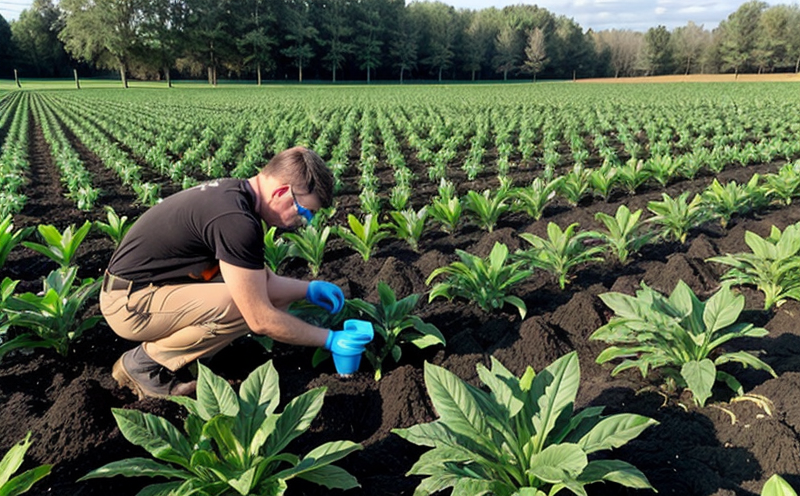Fulvic Acid Content Testing in Fertilizers
Understanding and ensuring the optimal content of fulvic acid in fertilizers is crucial for agricultural productivity and sustainability. Fulvic acid plays a vital role in enhancing plant growth by improving nutrient uptake, stimulating root development, and providing protection against environmental stresses such as drought and extreme temperatures.
Fulvic acid is a complex organic polymer derived from decomposed plants and microorganisms. It acts as a natural chelator, binding with mineral nutrients to form complexes that are more easily absorbed by plant roots. This makes fulvic acid an essential component in modern fertilizers designed for enhanced nutrient efficiency.
The testing of fulvic acid content is critical for several reasons:
- To ensure compliance with international standards and regulations, such as ISO 17254-3:2019, which outlines the methods for determining the total organic carbon (TOC) in solid fertilizers.
- To guarantee that the fertilizer meets specific quality control benchmarks set by manufacturers or regulatory bodies.
- To provide accurate data for research and development efforts aimed at improving the efficacy of plant nutrition.
At Eurolab, we employ advanced analytical techniques to accurately measure fulvic acid content in fertilizers. Our methodologies are based on standardized procedures that ensure precision and reliability. For instance, we use TOC analysis combined with high-performance liquid chromatography (HPLC) to identify and quantify fulvic acid.
Specimen preparation involves thorough sampling of the fertilizer product followed by extraction techniques tailored to separate fulvic acid from other components. This process is critical for obtaining accurate results that reflect true content levels in commercial products.
The instrumentation used in our testing facilities includes state-of-the-art spectrometers and chromatographs capable of detecting even trace amounts of fulvic acid. Our experts ensure the integrity of each sample throughout the entire process, from collection to analysis.
Reporting is comprehensive, providing detailed information about the fulvic acid content along with any additional insights regarding the overall quality and performance characteristics of the fertilizer under examination. This data can be invaluable for stakeholders involved in agricultural decision-making processes.
Benefits
The accurate determination of fulvic acid content through rigorous testing offers numerous benefits:
- Enhanced Nutrient Efficiency: Fulvic acid helps unlock the full potential of macro and micro nutrients present in fertilizers, leading to more effective plant nutrition.
- Better Crop Yields: By improving soil health and root development, fulvic acid contributes directly to increased crop yields and improved overall agricultural productivity.
- Sustainable Practices: Ensuring proper fulvic acid content supports sustainable farming practices that promote environmental stewardship without compromising yield or quality.
- Regulatory Compliance: Accurate testing ensures adherence to international standards, thereby facilitating smoother trade and compliance with local regulations.
- Informed Decision-Making: Reliable data from fulvic acid content tests allows for better-informed decisions regarding fertilizer selection and application rates.
- Research Support: Precise measurements contribute valuable information to ongoing research efforts aimed at advancing plant nutrition science.
These benefits underscore the importance of thorough testing in ensuring high-quality fertilizers that support sustainable agricultural practices while maximizing economic returns for producers and farmers alike.
Eurolab Advantages
At Eurolab, our commitment to excellence extends beyond just providing accurate results; we offer a range of advantages that make us the preferred choice for fulvic acid content testing:
- Expertise and Experience: Our team comprises highly skilled professionals with extensive experience in agricultural chemistry, ensuring precise and reliable test outcomes.
- State-of-the-Art Facilities: Equipped with the latest analytical equipment, our laboratories provide unmatched precision and accuracy for all testing needs.
- Comprehensive Reporting: Detailed reports not only include fulvic acid content but also other relevant parameters that contribute to a holistic understanding of fertilizer quality.
- Customer Satisfaction: We prioritize client satisfaction by offering prompt service, transparent communication, and ongoing support throughout the testing process.
- Sustainability Focus: Our services align with broader sustainability goals, promoting environmentally friendly agricultural practices through informed decision-making.
- Customized Solutions: Tailored approaches to meet individual client requirements, whether it's for routine testing or complex research projects.
These advantages reflect our dedication to delivering superior service and supporting the needs of our diverse clientele in the agricultural sector.
Environmental and Sustainability Contributions
The role of fulvic acid content testing in fertilizers extends beyond immediate benefits; it also contributes significantly to environmental sustainability:
- Reduced Chemical Usage: By optimizing the use of fulvic acid, less synthetic chemical inputs are required, reducing overall environmental impact.
- Improved Soil Health: Fulvic acid promotes better soil structure and fertility, leading to healthier ecosystems that support biodiversity.
- Enhanced Water Retention: Improved soil health translates into better water retention capabilities, contributing to more efficient irrigation practices.
- Emission Reductions: By promoting sustainable farming methods, fulvic acid content testing helps reduce greenhouse gas emissions associated with traditional agricultural practices.
- Bioavailability Improvement: Fulvic acid enhances the bioavailability of nutrients, reducing leaching into water bodies and minimizing pollution risks.
- Supporting Biodiversity: Healthy soils foster greater biodiversity, supporting a wide range of plant species that contribute to ecosystem resilience.
These environmental contributions underscore the broader impact of fulvic acid content testing on sustainability efforts in agriculture.





